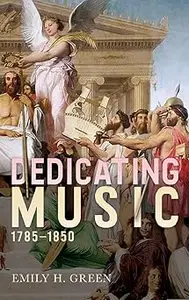
Free Download Emily H Green, "Dedicating Music, 1785-1850 "
English | ISBN: 1580469493 | 2019 | 260 pages | AZW3 | 77
7 KB
A synchronic study that highlights the importance of printed packaging, rather than notes on the page, to the complex relationship between composers, ✅Publishers, and consumers of music.
Why dedicate music? What did dedications mean to their readers and writers, especially after 1785, when more works were offered to fellow composers as well as to patrons? Borrowing from book history and sociological theory, Dedicating Music, 1785-1850 is a large-scale study of patterns of dedications. Emily H. Green argues that the kinds of offerings printed in the late eighteenth through mid-nineteenth centuries reflect a changing financial and aesthetic landscape in which patronage was waning and independent artistry surging. Dedications labeled written music as a gift while presenting composers with an opportunity for self-promotion. They also contributed to a new kind ofbranding of music by communicating composers’ friendships and artistic allegiances..
Dedicating Music considers dedications issued in print between 1785 and 1850 in sets of overlapping corpuses: offerings to peers (as in Mozart’s string quartets dedicated to Haydn); to patrons (as in Ignaz Pleyel’s string quartets for Count Erdödy); to friends (as in Ferdinand Ries’s offerings for Beethoven); and dedications issued by ✅Publishers (as in Beethoven’s song "In questa tomba oscura," included in ✅Publisher Tranquillo Mollo’s collection offered to Prince Lobkowitz). The result is a synchronic study that highlights the importance of printed packaging, rather than notes onthe page, to the complex relationship between composers, ✅Publishers, and consumers of music.
EMILY H. GREEN is Assistant Professor of Music at George Mason University.
The University of Rochester Press gratefully acknowledges generous support from the Claire and Barry Brook Endowment of the American Musicological Society and the AMS 75 PAYS Endowment of the American Musicological Society, both funded in part by the National Endowment for the Humanities and the Andrew W. Mellon Foundation.
Read more










Leave a Reply
You must be logged in to post a comment.